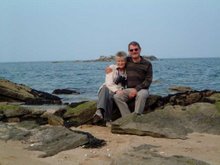San
Francisco is a city associated with big events and times: the 1849 goldrush,
the earthquake of 1906, the Golden Gate Bridge (opened in 1937), hippies in the
60’s and flowerpower in the 70’s, Alcatraz, and so on. My thoughts before
visiting San Francisco were- how would
the city square up to its image?
Well,
the Golden Gate Bridge didn’t disappoint. The hop-on/hop-off bus trundled off
to the bridge as one of its first stops, and very impressive (and windy) it was
too. When it opened, it was the longest single-span bridge in the world. The
colour is called International Orange, more rust than orange to me, and would
you buy an orange that colour in the supermarket?
And
are those street as steep as they look in photos? Some of them really are, and
here are the famous cable cars that ply these slopes. Between 1873 and 1890, twenty
three cable car lines were created; only three now remain, largely as tourist
attractions. The cable cars were introduced by a Mr Andrew Hallidie to
alleviate the suffering to the horses that hauled goods up and down the city’s perilous
gradients and sometimes slipped and fell.
Lombard
Street is reckoned to be the steepest street in the world. The top part has a natural
slope of 27%, that’s steeper than 1 in 4, but is modified by a series of 8
hairpin bends so that vehicles can safely manage the incline.
The
hippy and flowerpower area of yesteryear still maintains an ‘alternative’
appearance with brightly coloured shops, and associations with famous musicians
who lived there. This was Jimmi Hendrix’ house, although I can’t imagine he had
his face painted on the side when he lived there.
The
hop-on/hop-off guide said pot (cannabis) was freely and legally available, as the next
photo indicates. The sign says “Day Dream Smoke Shop”. There were quite a lot of
drifters around that seemed to be keeping in touch with the ‘change the world’
culture of the 60/70’s, but the reallity is that the world itself has changed a
lot since then and sadly left them behind.
A
more cheery sight was to be found in the harbour. Pier 39 has been the site for
many years of a congregation of sea lions. Hundreds gather there on wooden
rafts, with the dominant bulls displaying their prowess and making a huge noise
by constant barking and grunting
Nearly
a quarter of San Francisco’s population is of Chinese origin.Chinese culture
and language is very much alive, to the extent that chinese rather than english
is the first language for many. China
Town is the original Chinese quarter but these days this is as much a tourist
attraction as a residential district. The shops and buildings were quite
different from the rest of the city so it made an interesting walk-through.
San
Francisco was a town full of victorian houses until the earthquake of 1906. The
fire following the earthquake destroyed most of the wooden buildings. But some
survived and are preserved as architectural treasures. Here are a couple of
photos, but probably not the best of them.
Modern
buildings dominate the skyine in the financial district, but nothing on the
scale of the cities in Eastern America. Another two photos give examples that show
pleasant modern designs.
The
city will always be associated with Tony Bennet’s song, ‘I left My Heart In San
Francisco’. The words and music endear you to all of San Francisco’s charms,
even the fog that is actually clammy and unpleasant.
Tony
Bennet is himself a New Yorker, but really does have a soft spot for San Francisco. He should do, the song’s
earned him a lot of money! Also, Tony is an artist, and has painted the heart
that he left behind. Here it is, in the central square, featuring also the
bloke on the left’s behind that he’s in the process of taking with him.
Our
verdict is that San Francisco was an interesting and compact city, so fairly easy to see in a
short time. However, although three days of visiting a city is hardly enough to
know it properly, we couldn’t say we would be drawn back to it- so we didn’t
leave our hearts there.
But
we’ve not finished with San Francisco yet: the following blog is Alcatraz.













No comments:
Post a Comment